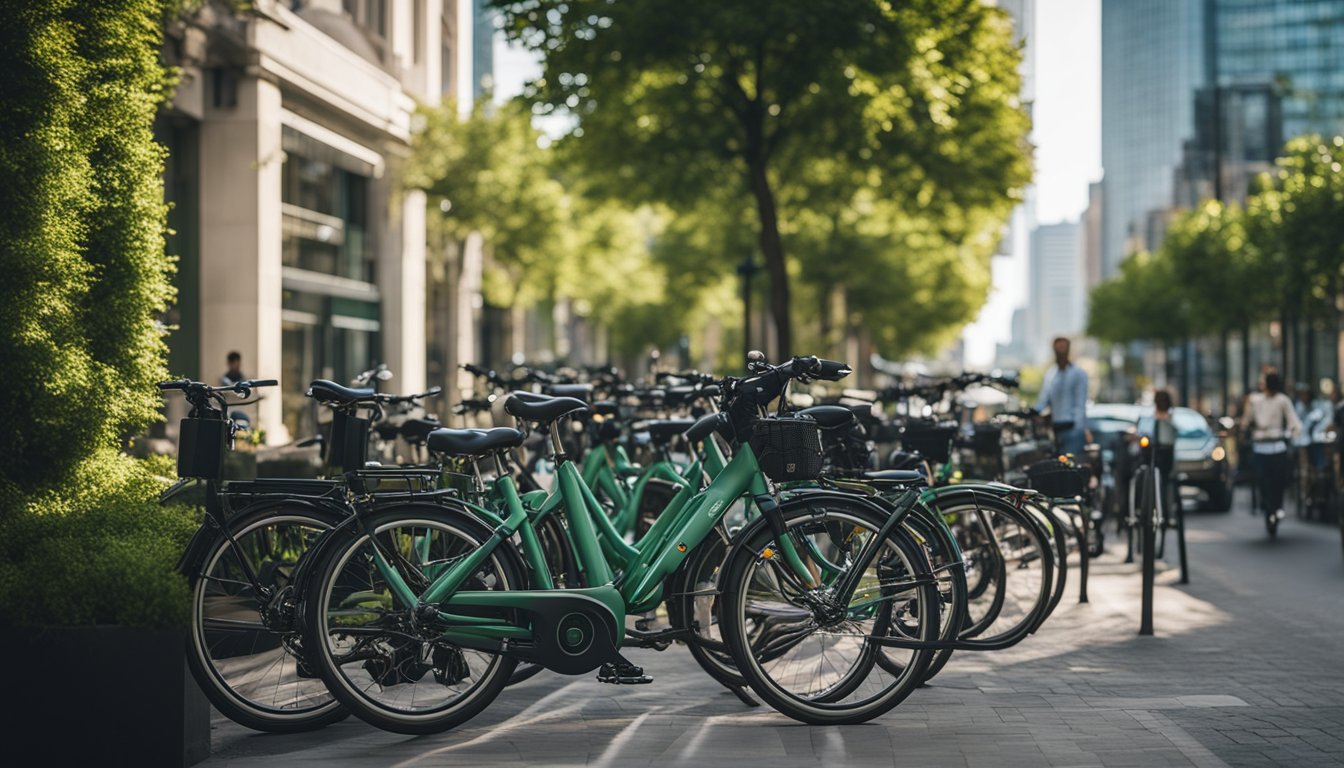Late updated: 16 Dec 2024 13:12
Written by: Amber Collins
Sustainable Commuting Strategies For UK Businesses: Boost Efficiency and Green Initiatives
As climate change looms large, UK businesses are increasingly aware of their role in minimising environmental impact. Sustainable commuting strategies are not just a trend; they are essential for maintaining both ethical responsibility and competitive advantage. Balancing these strategies with economic viability and employee satisfaction is key to driving positive change.

Creating sustainable commuting options is vital for UK businesses aiming to reduce their carbon footprint while boosting employee productivity. By encouraging practices like ride-sharing, cycle-to-work schemes, and flexible working hours, companies can foster a culture of sustainability and innovation. These steps also support wider sustainability goals, making them crucial for any business intent on long-term success.
In this blog post, we will explore how businesses can develop and implement innovative commuting frameworks that align with both employee needs and corporate sustainability objectives. Through thoughtful strategy and commitment, we can contribute to a more sustainable future.
Key Takeaways
- Developing sustainable commuting options supports business productivity.
- Strategies like cycle-to-work schemes help achieve sustainability goals.
- Aligning commuting frameworks with climate change efforts is essential.
Developing a Sustainable Commuting Framework for UK Businesses
Creating a sustainable commuting framework involves analysing existing patterns, integrating eco-friendly options, and fostering flexible work environments. By focusing on these areas, we aim to minimise environmental impact and promote long-term sustainable practices.
Assessing Commuting Patterns and Environmental Impact
First, understanding current commuting patterns is essential for developing effective strategies. We analyse data on travel modes, distances, and emissions to identify the most impactful changes. Environmental impact assessments help us evaluate carbon footprints associated with different commuting options. By incorporating climate research, we can set realistic goals for emission reductions.
A closer examination of greenhouse gas emissions and CO2 levels provides insight into areas needing improvement. This data informs decisions on suitable innovations, such as promoting carpooling and increasing the use of public transport.
Implementing Eco-Friendly Commuting Options
To reduce emissions, businesses are encouraged to adopt eco-friendly transport solutions. Offering benefits such as the Cycle to Work scheme encourages active travel. Providing incentives for electric vehicles and low-emission vehicles can further decrease the carbon footprint.
Integrating sustainable transport options like improved access to public transport can make a significant difference. Implementing tax incentives for greener commuting choices supports both employees and employers in achieving their environmental goals. Encouraging these changes not only addresses our ESG principles but also enhances our organisational commitment to the planet.
Promoting Remote and Flexible Working Cultures
Remote work and flexible working hours play a crucial role in sustainable commuting. By allowing employees to work from home, we significantly cut down CO2 emissions tied to daily commutes. Implementing policies that promote remote work as a norm helps in reducing overall emissions.
Flexible work schedules can also support sustainable commuting by allowing employees to avoid peak traffic hours, thereby contributing to lower emissions. Building an organisational culture that values flexibility ensures that we address both environmental impacts and employee satisfaction, balancing opportunity and risk effectively.
Strategies for Achieving Net-Zero Commuting in UK Business Operations

Implementing net-zero commuting strategies requires a comprehensive approach. We must leverage partnerships, monitor commuting patterns, and engage employees actively to promote sustainable practices. The key focus lies in integrating technology and policy to reduce carbon footprints.
Leveraging Government Schemes and Partnerships
To achieve significant reductions in commuting emissions, we can collaborate with governmental initiatives and establish partnerships. Many government schemes, such as subsidies for electric vehicle charging infrastructure and investments in public transportation, offer financial incentives. Partnering with organisations like the CBI helps align net-zero targets with national climate goals.
Through shared transport improvements, we can explore green commuting options like walking groups or carpooling programmes. These initiatives not only decrease travel emissions but also foster a sense of community among employees. It is crucial to stay informed on Labour’s plan and other legislative changes to capitalise on evolving opportunities.
Monitoring and Incentivising Low-Emission Commutes
Monitoring the commuting habits of our workforce is vital. Using tracking tools to collect data on carbon emissions from various modes of transport enables us to pinpoint areas for improvement. Offering incentives, such as discounts on renewable energy subscriptions or e-bike schemes, encourages sustainable commuting practices.
Financial rewards for employees who choose low-emission options can further reduce emissions. Introducing carbon offsetting programmes for necessary business travel also mitigates our environmental impact. It is essential to create a transparent system that recognises and rewards greener miles travelled.
Engaging and Educating Employees on Sustainable Practices
Engagement and education are key to fostering a culture of sustainability within our organisation. Hosting workshops on the environmental benefits of cleaner commuting options, like public transportation and cycling, increases awareness. We aim to inspire a shift towards adopting clean power alternatives.
Encouraging dialogue about the changing climate, its impacts, and how our collective action can make a difference strengthens commitment to net-zero goals. Our role extends to providing resources and tools for employees to make informed decisions regarding their daily commutes. By embedding these practices into our culture, we support a cleaner, more sustainable future for all.
Frequently Asked Questions

In the realm of sustainable commuting, businesses play a vital role. We explore practical ways to implement green commuting strategies, highlight London's innovations in transport sustainability, and suggest how workplace facilities can encourage environmental responsibility.
How can UK businesses encourage employees to adopt more sustainable commuting practices?
Businesses can encourage their teams by providing subsidies for public transport, incentivising carpooling, or offering facilities for cyclists. Setting up car-sharing schemes and flexible work hours can also support environmentally responsible commuting.
What are the most effective incentives for promoting sustainable commuting in UK workplaces?
Offering incentives like discounted transit passes, cycling bonuses, or telecommuting options can drive employee engagement in sustainable practices. Providing a rewards system for eco-friendly commuting may also motivate employees significantly.
In what ways has London's transport system enhanced its sustainability?
London has improved sustainability through investment in electric buses, expansion of cycling infrastructure, and encouragement of low-emission zones. The implementation of congestion charges further supports efforts to reduce traffic and emissions within the city.
What actions can UK companies take to support the national sustainable transport strategy?
UK companies can align with national goals by investing in low-emission fleet vehicles and promoting remote work options. Participating in government-supported initiatives and collaborating with local councils for better infrastructure also reflects a commitment to sustainable transport.
How can improving workplace facilities contribute to more environmentally-friendly commuting?
Upgrading facilities to include secure bike storage, showers, and changing rooms can make cycling and walking more attractive for employees. Providing electric vehicle charging points is another way to support those using cleaner transport options.
What are the key elements of a successful sustainable commuting plan for a UK business?
A successful plan requires clear goals, regular monitoring, and employee involvement in the decision-making process. It should include tailored solutions like transit subsidies, flexible work arrangements, and robust communication to encourage and maintain sustainable commuting practices.
